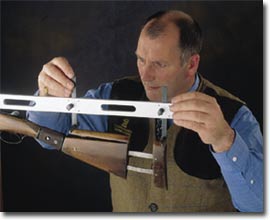
Gun Fitting
Custom Gun Fitting
“A Custom fitted gun is the pre-requisite to achieving a shooters full potential”
- CHRIS BATHA
Chris Batha is the custom gunfitter for E. J. Churchill Gunmakers, London, England. He is also the Gunfitter of choice to many of the best London gun manufacturers in the UK and the USA.
Custom gun fitting is done with both side-by-side and over and under try-guns, with pattern plate testing.
To arrange for a custom gunfitting, contact ChrisBatha@aol.com
“If you want the Rolls-Royce of fittings, fly to London, stay at Claridge’s, and take a cab out to West Wycombe, where Chris Batha will fit you, take you for a sumptuous lunch, and then come back for an afternoon of instruction followed by an hour in the simulated driven-grouse butt. You will be a few thousand dollars poorer (but spiritually considerably richer). "
-Terry Wieland,
Author and Editor of Gray’s Sporting Journal
The following article will answer some questions you may have about gunfitting:
Q: Does a gun need to be fitted to shoot well?
A: Consider the first thing that you do on entering a new car. You adjust the seat and mirrors to suit your personal requirements, in particular the height and leg room of the seat so you can easily reach the controls, and ensure good vision of the road, instruments and mirrors. These adjustments are an essential aid to good and safe driving. A secondary consideration is comfort. A well-adjusted seat allows you to maintain concentration when the car needs to be driven for long periods. We have all suffered from a poor driving position and the resulting agony to back or neck it can cause. An off-the-rack shotgun will do the job, but a custom-fitted one becomes a source of confidence and comfort and a joy to own and use.
Q: Is it possible to shoot successfully with an ill-fitting gun?
A: You can shoot an unfitted gun with a great deal of success; however, this will always be achieved by a compromise in style and technique. You will have to adapt yourself to the gun to achieve proper eye-muzzle relationship. This need to conform to the gun will necessarily create a pause or break in your natural mount or swing that on those split-second timing targets causes a miss, or at minimum, inconsistency
Q: What is a pattern plate?
A: The pattern plate’s role in gun fitting is to check the point of impact of the pattern, its pellet distribution and position. This is utilized in gunfitting by firing at the plate from fixed positions. The eye, on average, is three feet from the end of the barrel. If the plate is shot from the 16 -yard marker, the mathematics of three feet into 16 yards equates that 2 inches on the plate is an eighth of an inch on the gun. Thus, if you are a right-hander shooting four inches to the left of the aiming mark then you would require one quarter inch of cast-off to align the gun to the eye. This formula is applied equally at 32 yards with 2 inches representing a sixteenth of an inch on the gun. Used this way, the pattern plate gives accurate feedback to the gunfitter to make the necessary adjustments to achieve a perfect fit.
Q: What is a try gun?
A: The try-gun, invented by W.P. Jones in the 19th century, is a gun with a stock that can be adjusted for length, cast and bend or drop. When used in conjunction with the pattern plate it enables the fitter to make a series of alterations to achieve perfect fit. Once the fit is obtained at the pattern plate, the try gun can be shot on moving targets, where comfort and accuracy can be double-checked.
Q: How are guns altered to make them fit?
A: Once accurate sets of measurements are taken from the try gun the measurements can be taken to a competent gunsmith. By using heat and oil - or, very rarely, steam - the gunsmith bends or shapes the gun to the desired dimensions, and the adding or reduction to the stock easily achieves length.
Q: What are the gunfitters’ measurements?
A: Drop: The measurement from a parallel line taken from the rib of the gun to the stock at the comb and heel.
Length: Taken from the trigger (the front one on a double triggered gun) to the end of the stock at heel, middle and toe.
Cast: taken from a vertical line through the center of the heel of the stock and measured against a straight edge from the rib, at the heel and toe. (A special tool called a “banjo” is usually used for this important measurement.)
Q: What are my cross-eyed dominance options?
A: If you are cross dominant, that is, you shoot off the shoulder opposite your dominant eye, you will need to close the dominant eye or obscure it in some way when shooting. A patch or an opaque lens on a pair of shooting glasses will do the job just fine. The failure to cover the dominant eye will result in your missing the target two to four feet to one side. If it is at all possible, you should learn to shoot off the shoulder of the dominant eye. If the desire is great, it is possible to convert successfully, even later in life.
This article first appeared under the title: “Good Fitting Guns are the First Place to Start” by Chris Batha, in “The Grouse Point Almanac”, Summer, 2002



